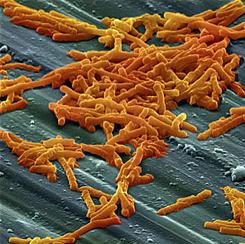Read More
Tags: Michigan State University, Midwest, BioResearch Product Faire Event, MI, East Lansing, MSU, new Building, new funding, 2016, Grand Rapids Research Center

Clostridium difficile, more commonly referred to as C. diff, is a bacteria that makes half a million American's sick each year, and is responsible for over 25,000 deaths annually, both directly and indirectly. The bacteria can lead to serious illnesses in the gut, that can cause diarrhea and colon inflammation. Often times, C. diff infections can be caused by the over use of antibiotics, which affect the healthy bacteria in the gut and provide opportunity for C. diff bacteria to grow in that area.
Researchers from the University of Michigan, Ann Arbor have received a five-year, $9.2 million grant from the National Institute of Allergy and Infectious Diseases to further study C. diff, to learn more about it with the aim of developing new treatment methods. (Image of C. diff bacteria courtesy of Cjc2nd via Wikimedia Commons)
Read More
Tags: University of Michigan, Midwest, Ann Arbor, BioResearch Product Faire Event, MI, UMich, 2016, Clostridium difficile, C. diff, C. difficile, Bacteria, gut bacteria
Over the past year, the life science research community has endeavored to control fat in response to the obesity epidemic. We’ve seen papers about reducing fat storage capacity and even burning fat at squirrel speed. However, a recent study by the Michigan State University suggests that fat may actually be linked to longevity.
Read More
Tags: Michigan State University, BioResearch Product Faire Event, MI, East Lansing, MSU, 2016
Bioscientists are constantly discovering new methods to accelerate bone healing. First, we saw them use stem cells to regenerate ribs, and then we saw them add a protein that boosts bone regeneration. Both of these techniques involve introducing new and foreign substances into the body, which run the risk of rejection. A new study from the University of Michigan, Ann Arbor shows that, in fact, cells already at the injury site know how to repair bone if you know how to remind them.
Read MoreTags: University of Michigan Ann Arbor, Ann Arbor, BioResearch Product Faire Event, MI, UMich, 2016
A few years ago, we witnessed the biotechnology industry’s first steps into bone regeneration; for instance, the University of Southern California was experimenting with stem cells to rebuild broken ribs. Now Michigan State University is learning the nuances of repairing more general bone fractures.
Read MoreTags: Michigan State University, BioResearch Product Faire Event, MI, East Lansing, MSU, 2016
Tags: Michigan State University, Ohio State University, University of Minnesota, UMN, TAMU, MI, TX, MN, OH, Texas A&M, MSU, OhStu, 2016, BioResearch Product Faire™
Two years ago, we saw a remarkable advance in 3D printing technology: a professor and a doctor at the University of Michigan, Ann Arbor designed a splint to open the collapsing windpipe of a baby. A licensing agreement signed this month between these specialists and the 3D printing company Materialise will help such splints become a medical norm.
Read MoreTags: University of Michigan Ann Arbor, 2015, Ann Arbor, BioResearch Product Faire Event, MI, UMich
We saw this July how researchers can help beneficial drugs evade an overly belligerent immune system by coating them in a honey mixture. Perhaps unsurprisingly, highly evolved pathogens are able to sneak past and even distract the defense mechanisms of plants. Bringing hope to the situation is a research group at Michigan State University at East Lansing who has found out a way to empower plants against such tricky attacks.
Read MoreTags: Michigan State University, 2015, BioResearch Product Faire Event, MI, East Lansing, MSU
Though it’s common knowledge that fruits and vegetables are part of a balanced diet, life science researchers continue to find health benefits in these foods beyond what anyone expected. Take the case of Ohio State University, for example, who three years ago found out that apples can lower levels of bad cholesterol. A new study from the University of Michigan, Ann Arbor suggests that bananas can fight off viruses we’d otherwise be susceptible to.
Read MoreTags: University of Michigan Ann Arbor, 2015, Ann Arbor, BioResearch Product Faire Event, MI, UMich
Though there is currently no known cure for human immunodeficiency virus (HIV), bioscientists at research universities across the globe are looking into ways to mitigate the disease. In our country, we’ve recently seen St. Louis researchers use bee venom to puncture HIV viruses and Twin Cities researchers investigate a genetic immunity to HIV. At Michigan State University, a team has discovered an inhibitor to the virus that is found inside the human body.
Read MoreTags: Michigan State University, 2015, BioResearch Product Faire Event, MI, East Lansing, MSU


